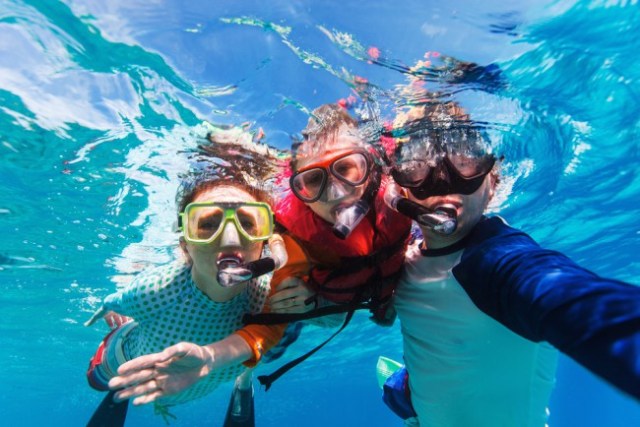Getting scuba certified together is a great way to build memories as a family. These rich and rewarding experiences can provide you with a fun, healthy activity to enjoy with your kids. They also help the big blue world remain important in your children’s lives.
Now, should you take your first giant stride together locally or on vacation? It’s a big decision, and there are several things to consider.
 No matter if you want to learn near home or on vacation, the pool sessions are a critical part of your learning.
No matter if you want to learn near home or on vacation, the pool sessions are a critical part of your learning.
At Home or on Vacation?
At first glance, it might seem like getting certified together locally would be the most efficient, convenient and affordable option. Still, does it beat a vacation certification? Accounting for all factors, a destination course might better meet your family’s needs and wants. Here are a few things to consider.
Who’s Getting Certified?
 There are PADI programs appropriate for many different age levels.
There are PADI programs appropriate for many different age levels.
Depending on the ages of your children, some might not be old enough to get certified with you. Kids as young as 8 years old can enroll in the PADI® Bubblemaker or Seal Team programs to see if they’re ready for scuba lessons. Younger kids younger can enjoy the ocean from the surface until they’re at a safer age.
Getting certified near home can help logistically. For example, friends or family members who aren’t participating can help with childcare/pick-ups/dinner. This can afford you more options and flexibility to complete the required classwork, pool sessions, and open water dives.
 In some dive locations, snorkelers and divers can ride out on the same boat.
In some dive locations, snorkelers and divers can ride out on the same boat.
On the other hand, if you get certified on holiday, there may be ways for everyone to participate together. Some dive shops can accommodate divers and snorkelers together on the same boat. In this way, the dive outing can still be a “shared” family experience even if people are doing different things.
Finally, if you’re choosing a vacation destination in a foreign country, they might have different age and/or health restrictions from PADI and your home country. Check before you book anywhere to make sure everyone who wants to get certified can do so!
Does Your Schedule Have Flexibility?
If you’re dreaming of a destination certification, one of the biggest things to keep in mind is your schedule. An Open Water Diver course can take 5 days to complete. If anything does go wrong (like you get sick or the weather acts up) and you have to reschedule any parts of your course, will you still have enough time to complete your certification? Sometimes, it can be tricky if you have to extend your trip to finish up.

Instead, if your timeline is tight, enrolling near home could provide you and your family with more flexibility. If anything forces you to opt out for a day, you can reschedule a pool session or open water dive for another weekend with relative ease.
How Do You Want To Spend Your Holiday?
While it is exciting to get certified in an exotic location, vacations aren’t cheap and time off from work can be hard to come by. Rather than spend your vacation time and money in a classroom, if you get certified at home, you can jet off with your family with your certifications in hand. You also will avoid additional hotel days necessary to accommodate a course’s duration.
Secondly, if you go to exotic dive locations already certified, you can opt for more diverse fun dives and see more amazing life underwater.
 Once you complete your training, you can go on different fun dives to encounter new creatures.
Once you complete your training, you can go on different fun dives to encounter new creatures.
On the other hand, if diving near home requires special gear like drysuits or if conditions are rougher, it may be desirable to begin your scuba journey on vacation. In a palace like the Florida Keys or the Caribbean, conditions are often less challenging and less intimidating. This is especially true for children or family members who are anxious. In these and other tropical dive destinations, waters are often calm and visibility is clear. Gear is usually minimal as you don’t worry about the drysuit or 7mm wetsuit (and weights) necessary for cold water dives. For these reasons, these places are very enticing for beginner divers.
The Referral System: The Best of Both Worlds?
There may be a third, hybrid option that provides the best of both worlds. If your local waters are too cold or too far away to make a local certification realistic and pleasant, you can request a referral from your local PADI Dive Shop.
First, you complete classroom and pool days nearby home. Then, get a referral that remains good for a year. Afterward, take that with you on vacation and complete your checkout dive and four open water dives where you want to. This can be done in two days!
By completing your lessons locally, you can still benefit from being near home and having more scheduling flexibility. Then, complete your dives while on vacation and use the time you would have spent in a classroom exploring and doing more fun dives!

Related Reading
Scuba Diving Lessons for Kids Top 6 Reasons to Get Scuba Certified Locally How to go about Booking your PADI Course Abroad How to Plan a Scuba Diving Vacation in 2021 Tips and Tricks For A Smoother PADI Open Water Diver Course PADI Open Water ReferralShare This
